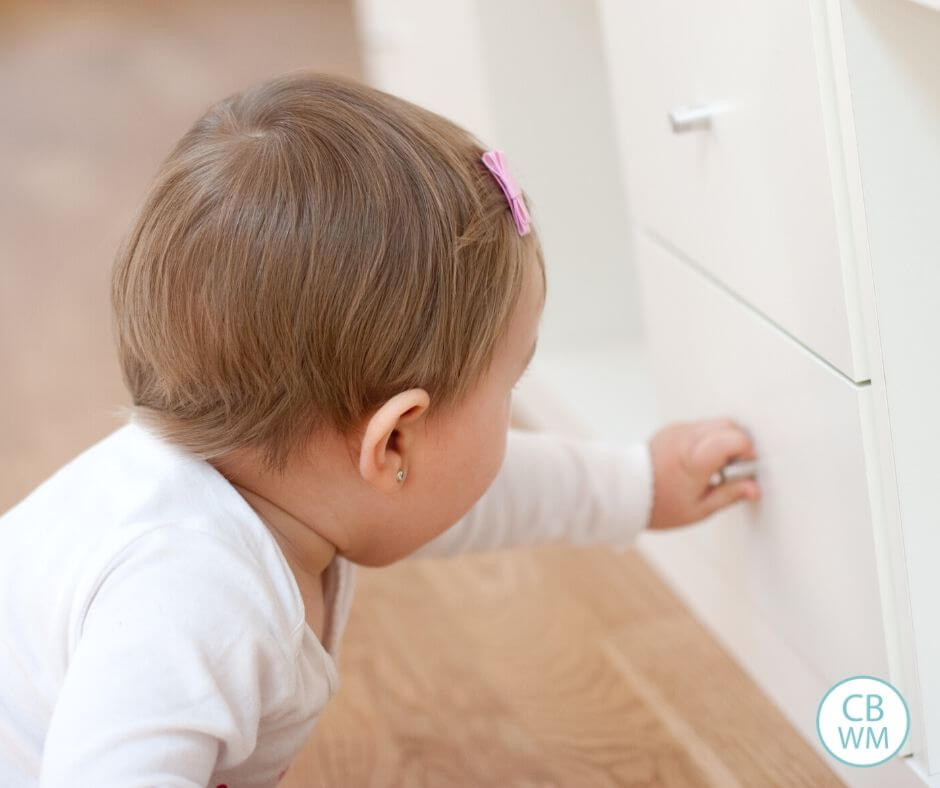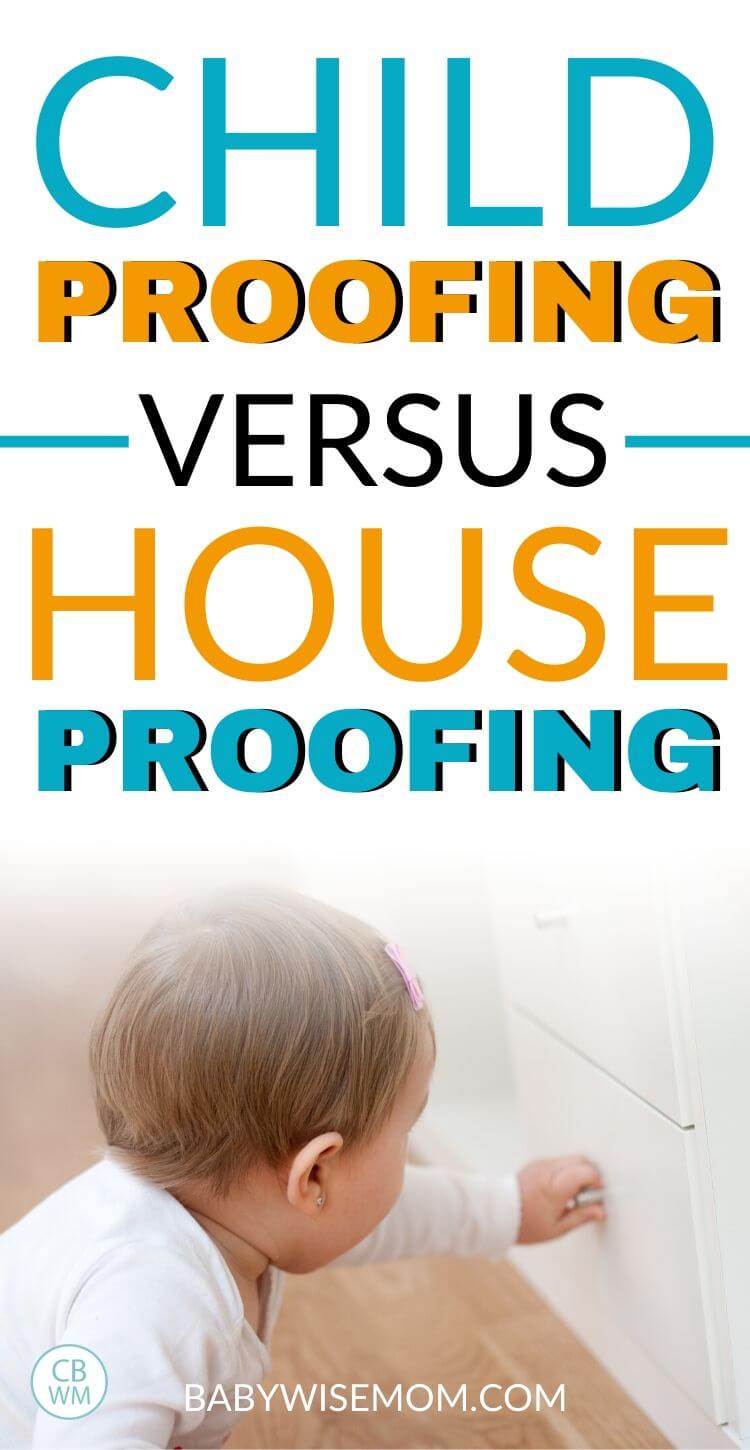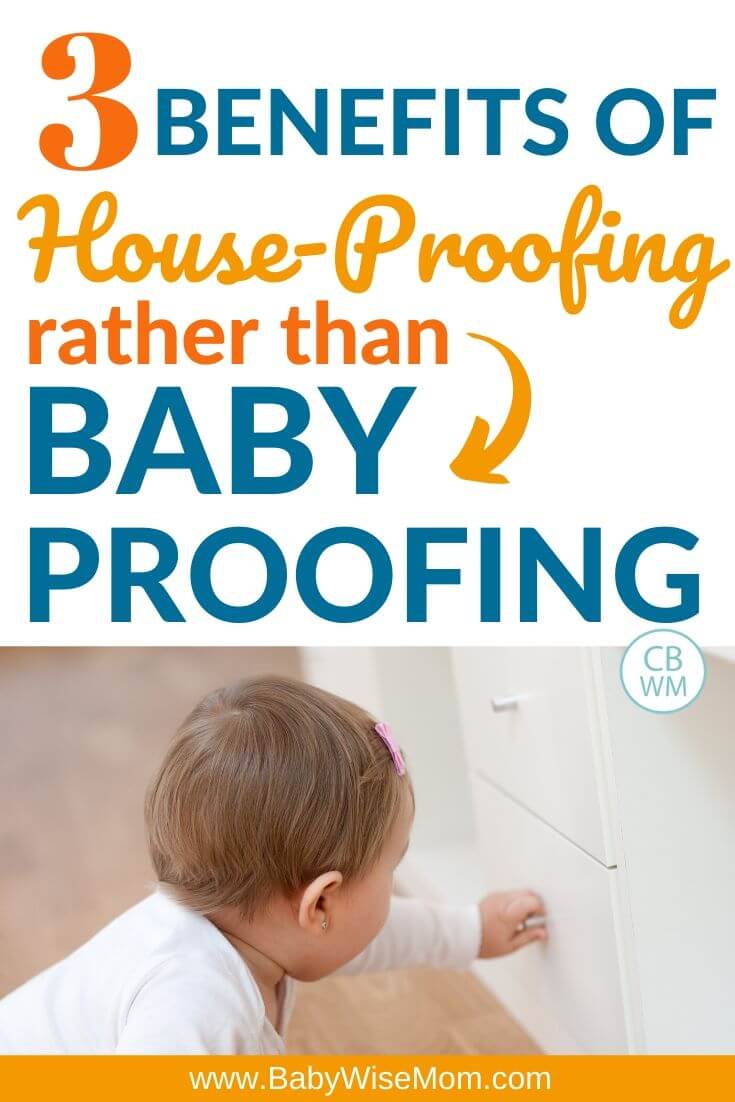Figure out when to babyproof, or childproof, your space and when to houseproof your little one. Some things need to be done, but not all things.

We parents all want our children to be safe. We feel very protective of our kids and want to make sure we remove risk from their lives for getting hurt.
Parents often wonder if they should child-proof their house or house-proof their child.
To childproof, or babyproof, a house means to remove all potential dangers from your home.
To house-proof a child means that you teach your child to obey when told not touch or do things.
Post Contents
Childproof Some Things and Houseproof Other Things
If you read my post Tips for Baby-Proofing Your Home, you will see that I am one who likes to house-proof my child as much as possible.
In that post, I have lots of reasons for why I do so, along with good safety ideas for what definitely should be done to “child-proof” your home.
There are some dangers that you can’t ignore and aren’t worth the chance. For example, if you have a child playing alone in her bedroom, it is wise to bolt the dresser to the wall.
You can instruct her to not climb the dresser, but all kids test boundaries and if your child will be playing alone there, you cannot keep an eye on her with that potential danger.
READ: How to Child-Proof Your Space for Independent Playtime
There are many times you have to decide when to enforce house-proofing and when you need to pick your battles and just child proof the children and the space. Read more about this in my post House-Proofing: Pick Your Battles.

House-Proofing Helps Teach Respect for Personal Property
I was recently contemplating why some children have respect for the property of others and why some don’t.
Some children seem to believe everything within their reach is fair game. They will take it, play with it, and leave it wherever they happen to be standing when they are done.
You might live near such children and find everything outside needs to be under lock and key or you will never see it again!
These are not children who are trying to steal or even really knowingly being rude. They just don’t realize that there are things in the world they shouldn’t touch. Everything they are exposed to has been baby-proofed, so they are rarely if ever told “no.”
I know children like this. They are children who are raised by wonderful parents who teach them strong morals and values. I have also known adults like this. It got me thinking.
Read: How to Teach Respect for Personal Property
As I thought about children old enough to make decisions of whether or not to touch things with the realistic expectation of them obeying, my thoughts led to the home.
I realized that homes that were child-proofed rather than house-proofed were producing children who didn’t have knowledge and control to not touch the property of others.
I am not talking about other kid’s toys; I am talking things in your garage or even cars. Whatever they can reach is fair game.
And doesn’t that just make sense? Doesn’t it make sense that a child who is given no physical restrictions in the home will carry that over around the neighborhood?
Doesn’t it make sense that the child who is allowed to be overly physically active in the home with balls and other toys because there is nothing breakable around will translate that into the homes of others?
Of course they will!

House-Proofing Your Child Helps Teach Boundaries
House-proofing your child helps your child to learn boundaries. It helps your child to learn respect for others and for the possessions of others.
You can’t touch whatever you want whenever you want in the real world.
When Brayden was 9 months old and I was following the advice to leave some things to be “off-limits” to him, I had not thought about this benefit.
As I told him over and over again to not touch a coveted item, I had no idea that it would lead to him having a respect for the property of other people.
But it worked! What a blessing to me, my neighbors, and himself!
Get more tips on boundaries in these posts:
- How to Set Boundaries
- How to Give Your Toddler Boundaries
- Why You Can Give Your Baby Rules and Boundaries
World-Proof Your Children
A huge premise of the book Free-Range Kids, at least what I take as a premise, is the idea that we shouldn’t shelter our children from the world, we should world-proof our children (page xii).
This really falls in line with my core belief about raising children–we are raising them to be able to leave us and be independent.
As author Skenazy says, “Helping kids? Good. Doing everything for kids? Bad” (page xiii). She encourages parents to be “…preparing their kids for the world, instead of sheltering them from it” (page xvii).
The hard question to answer is when and how to do these things.
Skenazy allowed her 9 year old son to ride the subway alone in New York City–an action that had people from all over shouting their opinions on whether or not it was okay.
I think most people would agree that yes, at some point this person needs to be able to ride a subway alone. What people do not agree on is what age is appropriate.
And you know what? I don’t think putting a blanket statement age on it is a fair thing in most circumstances. For more on the topic of shielding kids and when to let go, see Fine Balance of Protecting Children.
I think our real question, most of the time, will be when is this appropriate, not is it appropriate. Some will be an is; most will be a when.
And the answer, I think, will vary greatly from person to person. We all live in very different areas of the world, and we all also have very different life experiences that influence what risks we are willing to take.
Conclusion
As you decide what to house-proof and what to child-proof, keep in mind some main goals of keeping your kiddos safe, teaching them to listen and obey, teaching them to respect the property of others, and teaching them that there are boundaries and that they need to respect boundaries.
As you do these things, you will be able to discern when to remove items and when to leave them. House-proofing can do so much to help you teach your child valuable life skills, so don’t be afraid to do it!
Reader Comments and Questions
Kelly said: I totally get this mentality, and I have tried to give my now-17 month old boundaries. But you see, my child is a bit…of a free spirit. She is a natural limit-tester and one who seeks attention. I believe in discipline, and when I say NO, I want to mean it. So I have chosen my battles. Our whole house is 95% baby-proofed, while the other 5% is “off limits,” meaning she needs to obey. Now that she’s getting older, it seems to be easier with that 5%…but she still tests boundaries every now and then. What do you think?
BabywiseMom said: It is always wise to adjust things for your child’s individual personality. What I would do is make sure things are safe–if your child can’t be trusted to not stick something in the outlets, definitely cover them. Do what needs to be done to ensure real safety. After that, I would have things so your child learns to obey limits. But keep it age appropriate. An example would be that I have never used a baby gate on stairs at all. However, I don’t let my children go near the stairs without me until they are old enough to handle it. So even though I don’t have a physical barrier there, I make sure they are safe until they can handle it for their age.
Katie said: I feel so torn on this issue, and I think, as you said, it’s probably a matter of timing. This is an issue we’re carefully considering as we think about whether to homeschool our oldest son or not. I don’t want to do it to shelter him, although to a certain extent, kids always need “sheltering” – all people do, in fact. Just not always the same amount at the same time. It’s a tough thing to find the appropriate balance on, from day to day and year to year!
BabywiseMom said: Katie I agree that it is such a hard call. It is like my post where I talk about the “wall of waters.” And I think it depends on the child AND the school environment. Not all schools are equal. Some are “safer” than others.
Mrs. Madz said: I could not agree more with this thought: we must prepare our children from the world not protect them from it. I have some friends who wish and act like they live in Disneyland-they don’t let their children watch the news, or hear about bad things, or allow them to be exposed to anything tat is negative. What a disservice. My job is to teach my son to follow Christ and to live by his commands and how to deal with negative situations appropriately. I also agree it is more when than if…but how do you know if your being too overbearing? lol…it takes a mighty good friend to point that out!
This post originally appeared on this blog in March 2010
